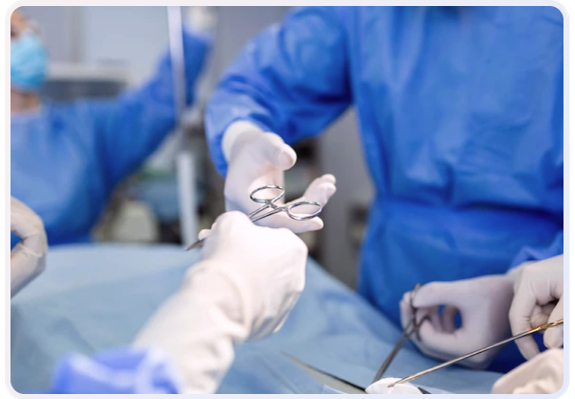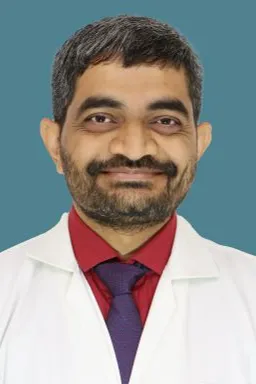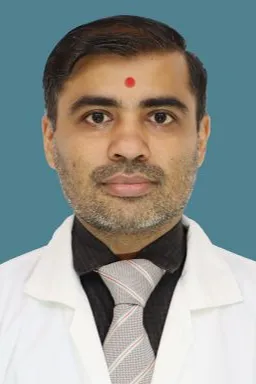Cancer-Oncology / Oncosurgery
Cancers are a group of diseases associated with abnormal growth of cells. Without any check, the disease may keep on progressing ultimately leading to pre-mature death. They can arise anywhere in the body and can affect people from all age groups, socio-economic strata and race. Cancer is the leading cause of morbidity and mortality in the world. According to data by International Agency for Research on Cancer, there were 141 lakh new cancer cases, 82 lakh cancer deaths and 326 lakh people living with cancer in 2012 worldwide. In our own country, about 4.7 lakh new cases of cancer are detected annually. Cancer is responsible for death of about 3.5 lakh people annually in India itself.
There are several major types of cancers: carcinomas form in the cells that cover the skin or line the mouth, throat, lungs and organs; sarcomas are found in the bones, muscles, fibrous tissues and some organs; leukemia is found in the blood, the bone marrow, and the spleen; and lymphomas are found in the lymphatic system.

Oral Cancer Surgery

- Oral cancer or mouth cancer, a type of head and neck cancer, is any cancerous tissue growth located in the oral cavity.
- There are several types of oral cancers, but around 90% are squamous cell carcinomas, originating in the tissues that line the mouth and lips.
- Oral or mouth cancer most commonly involves the tongue. It may also occur on the floor of the mouth, cheek lining, gingiva (gums), lips, or palate (roof of the mouth).
Signs And Symptoms
Skin lesion, lump, or ulcer that do not resolve in 14 days located:
- On the tongue, lip, or other mouth areas
- Usually small
- Most often pale colored, may be dark or discolored
- Early sign may be a white patch (leukoplakia) or a red patch (erythroplakia) on the soft tissues of the mouth
- Usually painless initially
- May develop a burning sensation or pain when the tumor is advanced
ADDITIONAL SYMPTOMS THAT MAY BE ASSOCIATED WITH THIS DISEASE:
- Tongue problems (moving it)
- Swallowing difficulty
- Pain and paranesthesia are late symptoms.
Premalignant Lesions
A premalignant (or precancerous) lesion is defined as "a benign, morphologically altered tissue that has a greater than normal risk of malignant transformation." There are several different types of premalignant lesion that occur in the mouth. Some oral cancers begin as white patches (leukoplakia), red patches (erythroplakia) or mixed red and white patches (erythroleukoplakia or "speckled leukoplakia"). Other common premalignant lesions include oral lichen planus (particularly the erosive type), oral submucous fibrosis and actinic cheilitis. In the Indian subcontinent oral submucous fibrosis is very common. This condition is characterized by limited opening of mouth and burning sensation on eating of spicy food. This is a progressive lesion in which the opening of the mouth becomes progressively limited, and later on even normal eating becomes difficult. It occurs almost exclusively in India and Indian communities living abroad.
Causes
TOBACCO
A premalignant (or precancerous) lesion is defined as "a benign, morphologically altered tissue that has a greater than normal risk of malignant transformation." There are several different types of premalignant lesion that occur in the mouth. Some oral cancers begin as white patches (leukoplakia), red patches (erythroplakia) or mixed red and white patches (erythroleukoplakia or "speckled leukoplakia"). Other common premalignant lesions include oral lichen planus (particularly the erosive type), oral submucous fibrosis and actinic cheilitis. In the Indian subcontinent oral submucous fibrosis is very common. This condition is characterized by limited opening of mouth and burning sensation on eating of spicy food. This is a progressive lesion in which the opening of the mouth becomes progressively limited, and later on even normal eating becomes difficult. It occurs almost exclusively in India and Indian communities living abroad.
ALCOHOL
- Human papillomavirus
Diagnosis
- An examination of the mouth by the health care provider or dentist shows a visible and/or palpable (can be felt) lesion of the lip, tongue, or other mouth area. The lateral/ventral sides of the tongue are the most common sites for intraoral SCC.
- A tissue biopsy, whether of the tongue or other oral tissues and microscopic examination of the lesion confirm the diagnosis of oral cancer or precancer.
- A tissue biopsy, whether of the tongue or other oral tissues and microscopic examination of the lesion confirm the diagnosis of oral cancer or precancer.
Management
- Surgical excision (removal) of the tumor is usually recommended if the tumor is small enough, and if surgery is likely to result in a functionally satisfactory result. Radiation therapywith or without chemotherapy is often used in conjunction with surgery, or as the definitive radical treatment, especially if the tumour is inoperable. Surgeries for oral cancers include
- Maxillectomy (can be done with or without orbital exenteration)
- Mandibulectomy (removal of the mandible or lower jaw or part of it)
- Glossectomy (tongue removal, can be total, hemi or partial)
- Radical neck dissection including various types
- Combinational e.g. glossectomy and laryngectomy done together.
- Feeding tube to sustain nutrition.
Owing to the vital nature of the structures in the head and neck area, surgery for larger cancers is technically demanding. Reconstructive surgery may be required to give an acceptable cosmetic and functional result. Pedicle or free surgical flaps such as the radial forearm flap, Anterolateral thigh flap, free fibular flap are used to help rebuild the structures removed during excision of the cancer. An oral prosthesis may also be required. Most oral cancer patients depend on a feeding tube for their hydration and nutrition. Some will also get a port for the chemo to be delivered.
Many oral cancer patients are disfigured and suffer from many long term after effects. The after effects often include fatigue, speech problems, trouble maintaining weight, thyroid issues, swallowing difficulties, inability to swallow, memory loss, weakness, dizziness, high frequency hearing loss and sinus damage.
Survival rates for oral cancer depend on the precise site, and the stage of the cancer at diagnosis.Survival rates for stage 1 cancers are approximately 90%, hence the emphasis on early detection to increase survival outcome for patients.
Know Your Cancer Risk
Here Some Of
Patients Speak
And Share Their Experiences




